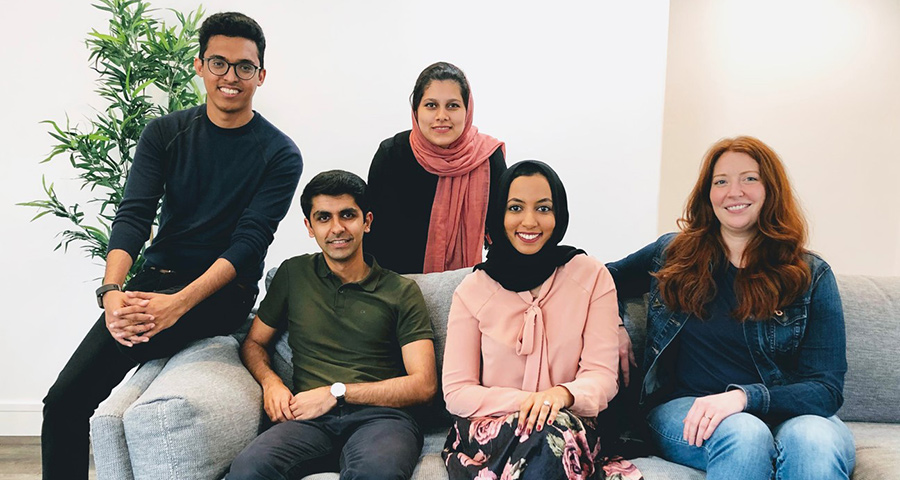
Gulf Times: Carnegie Mellon startup achieves international tech success
Stellic is an academic planning platform created by a group of CMU-Q students. After they graduated, they incubated the startup at Qatar Science and Technology Park (QSTP).
“QSTP startup achieves inspiring international tech success,” appeared in Gulf Times, September 24, 2019
The entrepreneurial journey of Qatar-based tech startup Stellic is a success story to inspire every budding techpreneur.
Incubated at Qatar Science & Technology Park (QSTP), part of Qatar Foundation Research, Development, and Innovation, Stellic – formerly Metis Labs – transformed an idea for a student project into a software tool now used in 15 universities across Qatar, Mexico and the US, where Carnegie Mellon University and University of Chicago have adopted the platform.
The tech startup venture was founded by three students while still at Carnegie Mellon University in Qatar, a Qatar Foundation partner university. And from their initial concept, Stellic – a fully-integrated portal that brings together academic planning, data analytics and career navigation – emerged.
“It’s a proactive tool that helps ensure people graduate on time – a goal that students and universities share,” says founder and CEO, Sabih bin Wasi.
Sabih was supported in his tech vision by his co-founders, front-end lead Rukhsar Neyaz, backend lead Jiyda Moussa, and scalability lead Musab Popatia, who joined later in the project. They are now a team of 10, spread around the world.
Stellic took its first steps towards becoming a fully-fledged startup business at QSTP, where the support and mentorship its team received have been major factors in the startup’s success.
“QSTP and Qatar Foundation have played a critical role in our success, and without these two entities, there is a high likelihood that Stellic would not exist today,” reflects Sabih.
In 2015, the team took part in cycle 2 of the XLR8 programme, QSTP’s flagship accelerator programme that supports the commercialisation of technology-based inventions. Over its three-month span, they were able to hone their entrepreneurial skills through the mentorship that would enable them to successfully launch their startup during the next phase of its development, as part of QSTP’s Incubation Program.
“When we first started Stellic,” adds Sabih, “there was no real startup culture in Qatar. QSTP helped us navigate through the challenges every up-and-coming startup faces at that early stage.”
During the intensive 12 month-programme at QSTP’s world-class Incubation Center, the Stellic team had access to a financial grant, incubation space, mentoring, product development, and coaching, and the expertise to establish a legal entity.
Within this innovation ecosystem, they were able to realise their dream of licensing the software and launching the fully-fledged product to the local market.
In 2017, QSTP supported Stellic to participate in a program at Silicon Valley where the budding techpreneurs got their first immersive experience of what it takes to be a successful international startup venture.
QSTP – which this year marks a decade since its founding – has incubated many startups; mentored some of Qatar’s brightest minds in innovation; and successfully introduced 31 commercialised innovative products to the Qatari market. And Stellic is an example of successes also being achieved in the international market.
By providing the full idea-to-invention scope of support to entrepreneurs, and the necessary infrastructure for innovation to thrive, QSTP has become a focal point for the tech innovation and entrepreneurship sector in Qatar.
Yosouf Abdulrahman Saleh, executive director, QSTP, says: “Supporting startups to address local market needs is at the heart of all QSTP’s programmes. We are committed to enabling techpreneurs to realise their business ambitions.
“QSTP is very proud to be a starting point for local startups that have gone on to enjoy commercial success after graduating from our accelerator programmes, here in Qatar and beyond.”
And Sabih is quick to point out the significance of the role that QSTP has played in helping Stellic towards achieving international success. “QSTP introduced us to the Alchemist Accelerator at Stanford University and we were able to build the relationships we needed to make the transition and break into the US market,” he says.
“The hardest part was branding, building relationships, and using our network to grow from a student project into a startup serving universities. We leveraged our network of QSTP advisers and used our access to Education City universities.”
“At QSTP, you see that the growing startup and entrepreneurial ecosystem in Qatar is real, not theoretical or aspirational. We are fortunate to have gone through multiple programs and interactions with QSTP over the last few years. To build something valuable, aspiring entrepreneurs who collaborate with QSTP need to be ‘all in’.”
